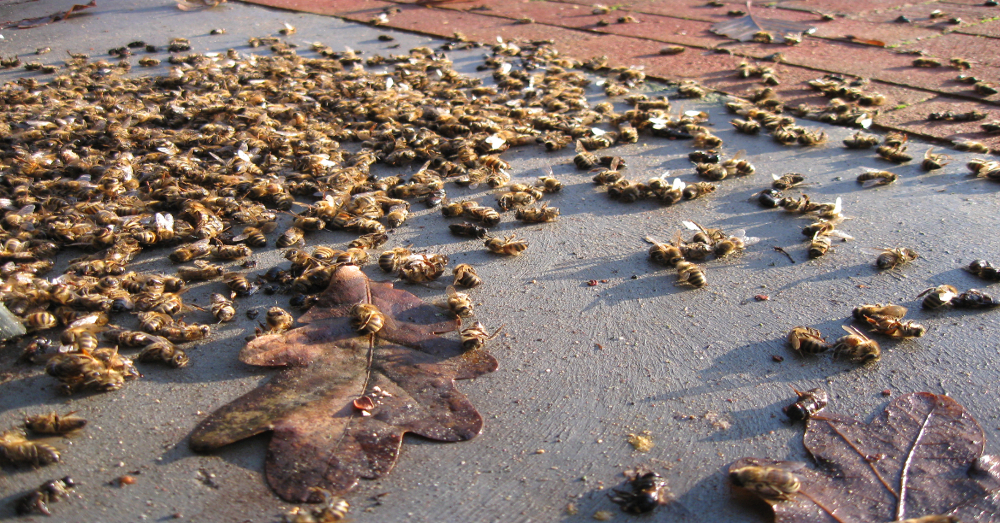
Roundup Weed Killer Called Out as a Bee Killer
Use of glyphosate, a weed killer registered in 130 countries, has risen exponentially since the introduction of genetically engineered (GE) glyphosate-resistant crops. Between 1974 — the year glyphosate entered the U.S. market — and 2014, glyphosate use increased more than 250fold in the U.S. alone. Today, an estimated 300 million pounds are applied on U.S. farmland annually.
October 9, 2018 | Source: Mercola.com | by Dr. Joseph Mercola
Use of glyphosate, a weed killer registered in 130 countries, has risen exponentially since the introduction of genetically engineered (GE) glyphosate-resistant crops. Between 1974 — the year glyphosate entered the U.S. market — and 2014, glyphosate use increased more than 250fold in the U.S. alone. Today, an estimated 300 million pounds are applied on U.S. farmland annually.
Globally, nearly 5 billion pounds (over 2 billion kilograms) of glyphosate are applied to farm crops each year.1 While GE crops were the catalyst for this tremendous surge in usage (since they were specifically designed to encourage farmers’ use of glyphosate), the chemical has also become a popular tool for desiccating non-GE grains and legumes, and that has also spurred its use.
About 70 different commonly consumed food crops are sprayed with glyphosate, so just because a food is not genetically engineered does not mean it’s free of glyphosate. As previously discussed in many articles, glyphosate and glyphosate-based weed killer formulations such as Roundup have been linked to a wide variety of human health consequences, including:
|
Non-Hodgkin lymphoma2 |
|
Impairing your body’s ability to produce fully functioning proteins3 |
|
Inhibiting the shikimate pathway (found in gut bacteria) |
|
Interfering with the function of cytochrome P450 enzymes, required for activation of vitamin D and the creation of nitric oxide |
|
Chelating important minerals4 |
|
Disrupting sulfate synthesis and transport5 |
|
Interfering with the synthesis of aromatic amino acids and methionine, resulting in folate and neurotransmitter shortages6 |
|
Disrupting your microbiome by acting as an antibiotic7 |
|
Impairing methylation pathways8 |
|
Inhibiting pituitary release of thyroid stimulating hormone, which can lead to hypothyroidism9,10 |
Alas, humans are not the only species suffering the effects of this widespread use of glyphosate. According to researchers at the University of Texas at Austin, glyphosate may also kill bees by altering the bacterial composition in the bees’ guts, making them more prone to fatal infections.11,12,13,14,15,16,17
Glyphosate Implicated in Bee Die-Offs
For years, researchers have struggled to pinpoint the reasons behind dramatically dwindling bee populations. This certainly isn’t the first time a pesticide has been implicated. Previous findings have shown neonicotinoid pesticides are particularly harmful to bees and other valuable insects such as butterflies.
In April 2018, the European Union banned the use of neonicotinoids as a result of such findings.18 Glyphosate, however, has long been considered harmless by U.S. regulators. This misconception is now crumbling in the face of mounting evidence to the contrary. Not only is glyphosate harmful to humans and mammals; insects, microbes and even the plants themselves are harmed in various ways.
According to the authors of this study,19 “bees rely on a specialized gut microbiota that benefits growth and provides defense against pathogens,” and “Exposing bees to glyphosate alters the bee gut community and increases susceptibility to infection by opportunistic pathogens.” Erick Motta, a graduate student at University of Texas at Austin and lead author told Science Daily:20
“We need better guidelines for glyphosate use, especially regarding bee exposure, because right now the guidelines assume bees are not harmed by the herbicide. Our study shows that’s not true … It’s not the only thing causing all these bee deaths, but it is definitely something people should worry about because glyphosate is used everywhere.”
How Glyphosate Kills Bees
Glyphosate works by targeting an enzyme called 5-enolpyruvylshikimate-3-phosphate synthase (EPSPS) in the shikimate pathway, found in plants and certain microorganisms. This EPSPS enzyme is found in most of the gut bacteria in bees, which is how they become susceptible to the toxic effects of the weed killer. The researchers explain:
“The honey bee gut microbiota is dominated by eight bacterial species that promote weight gain and reduce pathogen susceptibility. The gene encoding EPSPS is present in almost all sequenced genomes of bee gut bacteria, indicating that they are potentially susceptible to glyphosate.
We demonstrated that the relative and absolute abundances of dominant gut microbiota species are decreased in bees exposed to glyphosate at concentrations documented in the environment. Glyphosate exposure of young workers increased mortality of bees subsequently exposed to the opportunistic pathogen Serratia marcescens.
Members of the bee gut microbiota varied in susceptibility to glyphosate, largely corresponding to whether they possessed an EPSPS of class I (sensitive to glyphosate) or class II (insensitive to glyphosate) …
All strains of the core bee gut species, Snodgrassella alvi, encode a sensitive class I EPSPS … Thus, exposure of bees to glyphosate can perturb their beneficial gut microbiota, potentially affecting bee health and their effectiveness as pollinators.”
